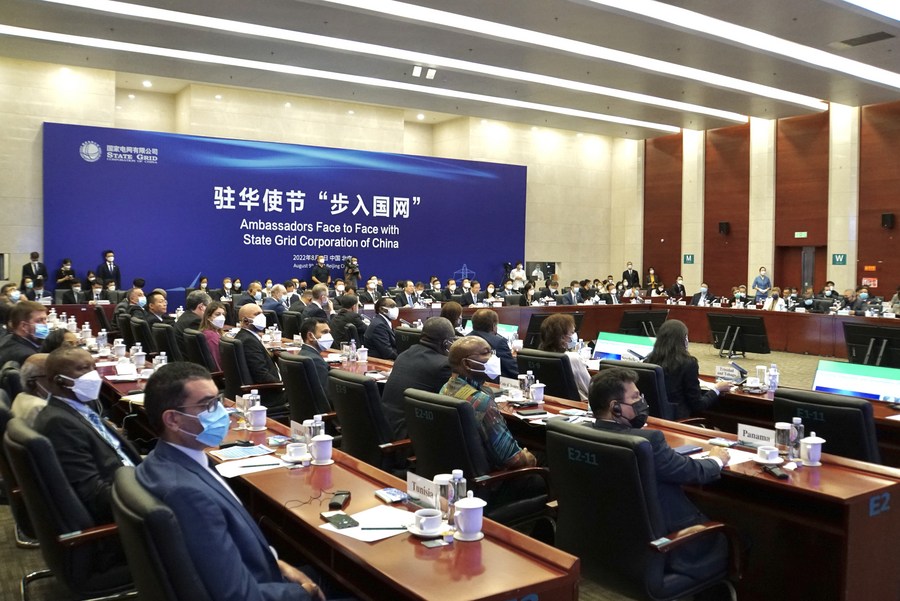Foreign envoys admire China's power grid innovation, seek cooperation

Foreign diplomats and representatives of international organizations in China have discussions with officials of the State Grid, Aug. 9, 2022. (Xinhua/Gao Jianfei)
BEIJING, Aug. 14 (Xinhua) -- Foreign diplomats in China spoke highly of China's innovation in power grid construction. They highlighted the need for seeking new cooperation with the country during a visit to the State Grid Corporation of China, the country's largest state-owned utility company.
"China is very well-known to be a champion now in terms of technology and innovation in the power sector," Milia Jabbour, ambassador of Lebanon to China, told Xinhua in an interview during the tour.
During the visit, the diplomats were informed about the company's efforts in securing power supply, technology innovation, and green energy transformation.
In pursuit of green development, the State Grid has invested heavily in research and development and has built the world's largest and most advanced simulation center. It has also developed advanced power transmission technology, including ultra-high voltage (UHV), and shared the technology with other countries.
The diplomats were deeply impressed by the Zhangbei renewable energy flexible direct current grid test and demonstration project, which enabled the supply of 100-percent green electricity to the three competition zones of the Beijing Winter Olympics.
From the beginning of the green electricity supply in early 2019 to the closing of the Beijing 2022 Paralympic Winter Games, the project saved an estimated 128,000 tonnes of coal from burning, reducing carbon dioxide emissions by 320,000 tonnes.
"I was happy and impressed to see that all the energy used for the Beijing Winter Olympics was green energy, which is a good example, a best practice to share with others," Milia Jabbour said, expecting cooperation with the State Grid.
Hallam Henry, ambassador of Barbados to China, hailed the efforts behind the project. "I think that shows great planning and design," he said.
The ambassador said Barbados is looking forward to deepening cooperation with the State Grid to amplify the advantage of Barbados' abundant solar resources to achieve its carbon neutrality by 2030. "It will be win-win cooperation."
China has vowed to peak carbon dioxide emissions by 2030 and achieve carbon neutrality by 2060. According to a five-year plan issued earlier this month, by 2025, the country's annual power generation from renewable energy sources will reach 3.3 trillion kWh, and renewable energy consumption will save the equivalent of 1 billion tonnes of standard coal.
While visiting the State Grid UHV test base, Joao Batista Magalhaes, counselor of the Brazilian embassy in China, appreciated China's achievement in developing power transmission and called Brazil a "beneficiary" of the progressive technology.
The counselor mentioned a power transmission project conducted by the State Grid in 2019. The over 2,500-kilometer-long power line has transmitted electricity from Brazil's north to south, meeting the power needs of tens of millions of residents, he said.
It supplies homes and businesses in Brazil's major cities with clean energy and spurs the regional economy by generating more jobs.
The project in Brazil marks an example of China's achievement in sharing its technologies to benefit the rest of the world. In the past decade, the State Grid has invested 25 billion U.S. dollars overseas and aided locals in power transmission and transformation projects and other grid infrastructure in countries including Pakistan and Ethiopia. It significantly improved the level of local power grid development and the quality of power supply.
Magalhaes expected a closer tie with the State Grid and welcomed expanded investment into Brazil. "It's important for us because we need this kind of technology and investment to improve the living conditions of our people," he said.


